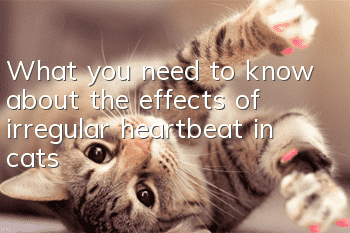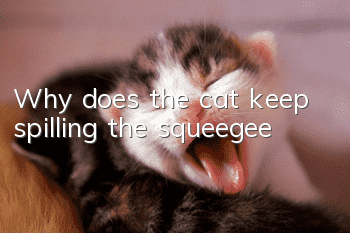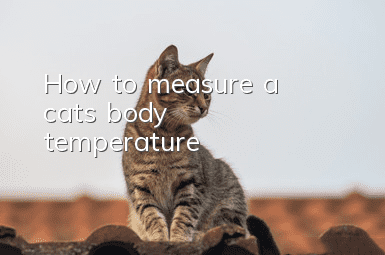What you need to know about the effects of irregular heartbeat in cats!

Cats with sinus arrhythmia have a heartbeat that is fast and slow
You need to know the effects of arrhythmia in cats! Cats, like people, have only one very regular normal heart rhythm. When the heart rhythm is very regular, the time interval between each heart beat is consistent, and the impulse signal sending point is usually located in the sinoatrial node of the heart, so it is called sinus rhythm. The heart rate speeds up during exercise and slows down during rest, but the time between each beat is not very different.
Arrhythmia refers to an irregular heart rhythm. Cats with sinus arrhythmia have a heartbeat that alternates between fast and slow. Compared to normal sinus rhythm, the time between each heartbeat varies.
1. Causes
The diseases that can cause increased vagus nerve tone in cats are similar to those in dogs, but vagus nerve excitement can hardly cause sinus arrhythmia in cats. together. Sinus arrhythmia in cats usually indicates a primary heart problem.
2. Clinical symptoms
Clinical symptoms related to heart disease may occur in cats with sinus arrhythmia. Affected cats may be quieter than usual and less likely to move. Breathing may be faster and harder than usual. Some cats with heart disease may also cough.
3. Diagnosis
The only examination method that can identify sinus arrhythmia and other arrhythmias is the electrocardiogram (ECG). If sinus arrhythmia is found during ECG examination, whether further testing is/is not required depends on the patient's clinical symptoms. Possible tests include laboratory tests, chest/abdominal x-rays, and echocardiography (cats).
4. Treatment
There are usually no corresponding treatment recommendations for sinus arrhythmia in cats, but heart disease should be treated.
If the patient's arrhythmia is very severe, an ECG may be needed to monitor sinus arrhythmia. Regular ECG monitoring is the only way to determine that no other pathological rhythm is present. Subsequent follow-up visits, monitoring, and examinations will depend on the underlying cause of sinus arrhythmia.
Medicine selection for heart disease:
1. Enalapril
Also known as ACE inhibitors, its function is to dilate blood vessels, Adjusts the activity of hormones that cause heart failure, and can effectively reduce the resistance of the heart to output blood flow. This type of drug has been successfully proven in many studies to effectively prolong the life of heart failure patients. Side effects of the drug include vomiting, diarrhea, hypotension, increased blood potassium concentration, or decreased kidney function.
2. Furosemide
It is a type of diuretic that can accelerate the elimination of excess tissue fluid and body fluids in patients with heart failure. The dosage will be based on the patient's suitability and clinical response. There is a lot of variation; but generally speaking, lower doses are more effective in controlling chronic disease.It is necessary to use it. This drug is used to treat pulmonary edema and cough symptoms caused by heart failure, and the response is usually good. Drug side effects include excessive tissue fluid, loss of body fluids and electrolytes, especially potassium ions, which can ultimately lead to dehydration or weakness.
Dietary management of feline heart disease
1. Control sodium intake corresponding to each disease stage.
2. Be wary of loss of appetite. Maintain a proper weight.
3. Food must have high palatability, high energy density, and high protein.
4. Nutrients necessary to maintain heart health: EPA, DHA, L-arginine, anti-reactive oxygen species, vitamin B complex, magnesium, glycine, and L-carnitine.
The prognosis for sinus arrhythmia in cats depends on the type and severity of the primary heart disease. For feline heart disease, through early detection, treatment and dietary management, the development of the disease can be delayed and the current living situation can be improved. Cats should be given a physical examination at least once a year, and elderly cats can be increased to twice a year. Some chronic diseases can be detected early, so that scientific management can delay aging. Don’t assume “this is a normal geriatric disease” and consult your veterinarian if there are any worrying changes in symptoms.
- Will a cat hate its owner if it is neutered?
- Why is there blood in cat urine?
- Will a cat not urinate without litter?
- What can cats eat
- How to measure the temperature of a cat
- Can cats eat vitamin B that humans eat?
- Why do cats lie down every now and then?
- The cat was startled and ran away from its owner
- Is it better for a novice to raise a male cat or a female cat?
- How to feed a kitten



